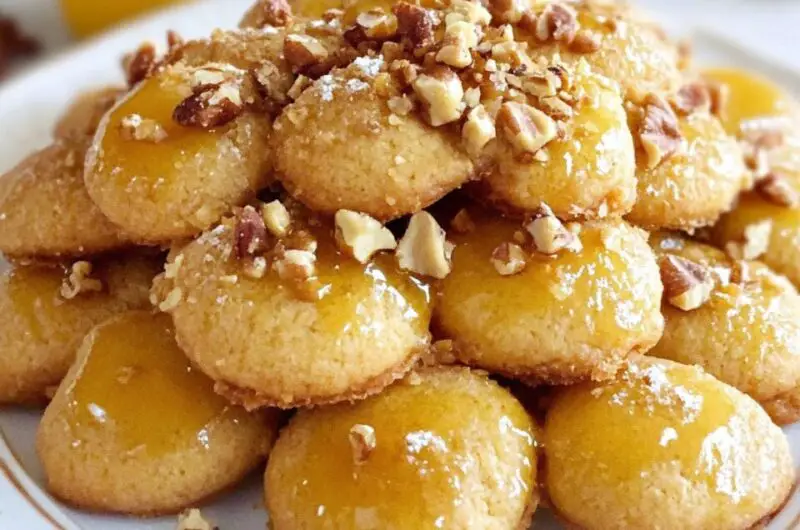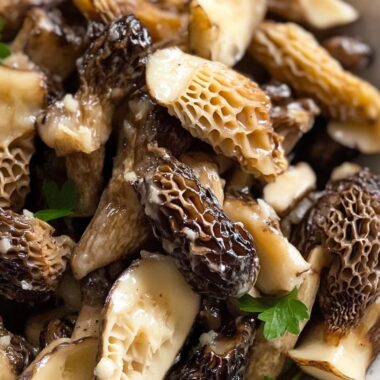The Melomakarona are a quintessential part of Greek holiday celebrations. These spiced cookies are traditionally made during Christmas and are soaked in a luscious honey syrup that infuses every bite with aromatic sweetness. Sprinkled with crushed walnuts, each cookie delivers the perfect balance of texture and flavor. Deeply rooted in Greek tradition, Melomakarona blend citrus, spice, and sweetness in a comforting and festive way. The olive oil-based dough makes them beautifully tender, while the honey syrup adds that signature Mediterranean richness. Whether you’re familiar with Greek treats or trying them for the first time, these cookies are sure to become a holiday favorite.
Full Recipe:
Ingredients:
-
1 cup olive oil
-
1/2 cup sugar
-
1/2 cup orange juice
-
1/4 cup brandy
-
Zest of 1 orange
-
1 tsp ground cinnamon
-
1/2 tsp ground cloves
-
1 tsp baking soda
-
1 tsp baking powder
-
4–4½ cups all-purpose flour
-
1 cup chopped walnuts
For the syrup:
-
1 cup honey
-
1 cup sugar
-
1 cup water
-
1 cinnamon stick
-
2–3 cloves
-
A slice of lemon
Directions:
-
Preheat the oven to 350°F (175°C).
-
In a large bowl, combine olive oil, sugar, orange juice, brandy, orange zest, cinnamon, and cloves. Whisk until smooth.
-
In a separate bowl, mix the baking soda and baking powder into 4 cups of flour. Gradually add the dry ingredients to the wet, kneading gently to form a soft dough. Add more flour as needed, but do not over-knead.
-
Shape the dough into small oval cookies, about 2 inches long.
-
Place on a baking tray lined with parchment paper and bake for 25–30 minutes, or until golden brown.
-
While cookies are baking, prepare the syrup: In a saucepan, combine honey, sugar, water, cinnamon stick, cloves, and lemon slice. Bring to a boil, then simmer for 10 minutes. Remove from heat and let cool slightly.
-
When cookies are baked and still warm, dip them into the warm syrup for 10–15 seconds. Let excess syrup drain and place on a platter.
-
Sprinkle generously with chopped walnuts.
Prep Time: 15 minutes | Cooking Time: 30 minutes | Total Time: 45 minutes
Kcal: 190 kcal per cookie | Servings: About 30 cookies
A Taste of Greek Christmas: The Rich History of Melomakarona
When it comes to Greek holiday traditions, food plays a central role especially sweet treats. At the heart of this festive indulgence stands the Melomakarona, the beloved Greek honey cookie that graces nearly every household during the Christmas season. Richly spiced, soaked in aromatic honey syrup, and sprinkled with chopped walnuts, Melomakarona are more than just cookies they are nostalgic bites of heritage, family, and celebration.
Originating in ancient times and evolving through Byzantine and Orthodox Christian traditions, these cookies carry the warmth and depth of centuries-old culinary wisdom. While they are most commonly baked around Christmas and New Year, many Greeks will tell you they find excuses to enjoy them throughout the colder months especially with a hot coffee or glass of sweet wine.
The Meaning Behind the Name “Melomakarona”
The name “Melomakarona” is derived from two Greek words: “meli” (μέλι) meaning “honey,” and “makaria” (μακαρία), which refers to a piece of bread offered during funeral rituals in ancient Greece. The “makaria” itself was a symbol of blessedness or a wish for eternal peace. Over the centuries, this morphed into a sweet biscuit, particularly enjoyed during religious feasts. The “honey” element came later, transforming the cookie into a joyous, celebratory dessert rather than a somber ritual item.
Today, the honey is symbolic of prosperity and sweet fortune perfect for ushering in the New Year with hope, warmth, and abundance.
Why Melomakarona Are So Special
Melomakarona stand out in the world of cookies not just because of their taste but because of their multi-layered flavor profile and satisfying texture. The combination of olive oil, orange juice, brandy, and warm spices such as cinnamon and cloves gives the cookie itself a rich, nuanced depth.
After baking, each cookie is soaked in a hot syrup made from honey, sugar, and fragrant spices, which infuses the crumb with sweetness while preserving its soft yet slightly chewy structure. Finally, they are topped with crushed walnuts, which adds an earthy crunch that contrasts beautifully with the syrupy softness.
They’re not overly sweet, which makes them perfectly balanced, even for those who don’t usually favor desserts. This moderation is a hallmark of traditional Greek confections sweet, but not cloying; rich, but not overwhelming.
The Role of Olive Oil in Greek Baking
One of the most distinctive features of Melomakarona is their use of olive oil instead of butter. This isn’t just a modern health-conscious adaptation it’s traditional and deeply rooted in the Orthodox Christian practice of Lenten fasting, which prohibits dairy.
Olive oil makes these cookies suitable for those observing fasts or following a vegan lifestyle (just skip the honey or substitute it). Moreover, olive oil contributes to the moist, tender texture and subtly earthy flavor that sets Melomakarona apart from butter-based holiday cookies like the kourabiedes (Greek shortbread).
Choosing a high-quality extra virgin olive oil makes a significant difference in the final taste. Greek olive oil is often the go-to for this purpose, especially oils from Crete or Kalamata, which are known for their rich and fruity profiles.
A Symbol of Festivity and Generosity
Melomakarona are deeply tied to the spirit of giving. In Greek culture, it is customary to prepare large batches and share them with neighbors, friends, family members, and co-workers during the holiday season. Offering homemade Melomakarona is considered a gesture of love, goodwill, and generosity.
In many homes, families bake together grandparents teaching children how to knead the dough just right or how long to dip them in syrup. This makes the act of baking them not only a culinary experience but a generational tradition, one that binds families and communities together.
Variations Across Greece
Though the classic Melomakarona recipe remains largely the same throughout Greece, there are regional variations and personal twists that reflect local tastes or family customs. Some households add semolina to give the cookie a grainier texture. Others might include a dash of nutmeg or use mandarin juice instead of orange for a different citrus note.
In Thessaloniki, some families like to fill the cookies with ground walnuts and spices, creating a more decadent, stuffed version. Meanwhile, some modern adaptations even include a drizzle of dark chocolate, a recent innovation that pairs surprisingly well with the honeyed and spiced cookie base.
Best Tips for Perfect Melomakarona
To elevate your Melomakarona from good to unforgettable, here are some expert tips:
-
Do not overwork the dough. Too much kneading activates the gluten and can make the cookies tough. Gentle mixing keeps them tender.
-
Use warm, not hot, syrup. Dip warm cookies in warm syrup so they absorb properly without disintegrating.
-
Allow resting time. Let the cookies sit overnight after syruping so the flavors fully develop and the texture becomes perfect.
-
Don’t skip the zest. Orange zest provides a fragrant brightness that balances the deeper flavors of spices and honey.
-
Chop walnuts fresh. Pre-packaged ground walnuts can lose their crunch and aroma over time. Freshly chopped nuts give better texture and taste.
How to Serve and Store Melomakarona
Melomakarona are best served at room temperature, ideally a day after baking so the syrup has fully penetrated the cookie. They pair wonderfully with:
-
A Greek coffee or espresso
-
A glass of Mavrodaphne, a sweet Greek red wine
-
Light dessert liqueurs such as Metaxa
To store, keep them in an airtight container at room temperature. They stay delicious for up to two weeks if they last that long! In fact, many claim the flavor improves after the first few days as the spices continue to meld.
A Cookie That Bridges Past and Present
While Melomakarona have their roots in ancient rites and religious customs, their enduring popularity comes from their sheer deliciousness and the memories tied to them. They’re a link between generations, a celebration of Greek flavors, and a sweet token of good wishes during the most joyous time of the year.
Advertisement
These cookies remind us that food isn’t just about nourishment it’s about culture, identity, and connection. Whether you grew up in a Greek household or are simply exploring new global traditions, baking Melomakarona offers a beautiful way to embrace a meaningful part of the Mediterranean holiday spirit.
Conclusion:
Melomakarona are more than just a Christmas cookie they are a warm embrace from Greece, a taste of history, and a celebration of togetherness. Their rich spices, golden honey syrup, and nutty topping make them an irresistible treat that holds a special place in Greek hearts and kitchens.
Whether you’re honoring a family tradition or discovering a new favorite recipe, Melomakarona will add depth, joy, and authenticity to your holiday table. Light a few candles, brew some Greek coffee, and savor the flavors of the season the way they’ve been enjoyed for generations.








